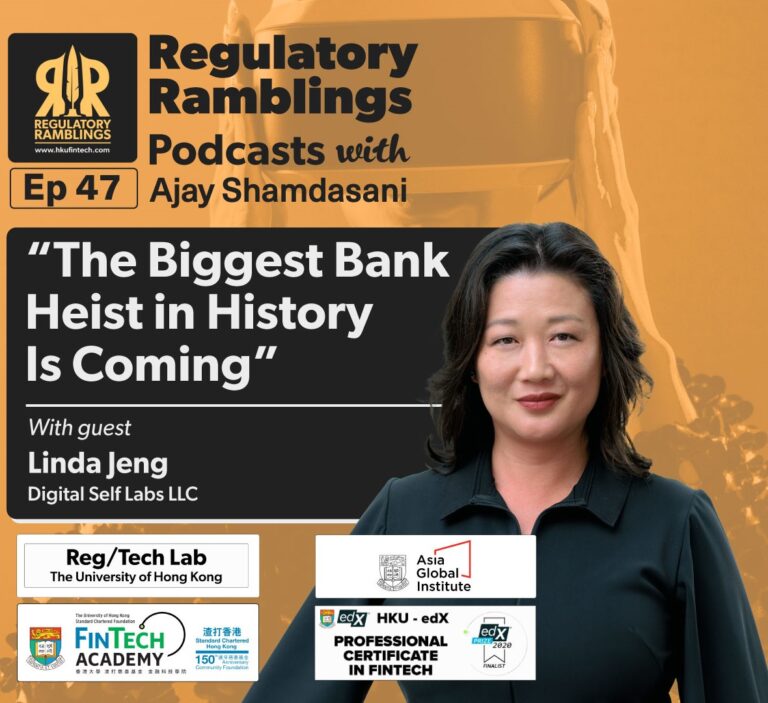Linda Jeng is a digital economy leader and strategist with over two decades of experience in FinTech, policy, and regulation. She is the founder & CEO of Digital Self Labs, a Washington D.C.-based Web3 advisory firm. Digital Self Labs is a cross-disciplinary advisory firm combining blockchain software expertise with policy and regulatory strategy.
Linda helps clients design and implement innovative solutions that empower individuals and enable interoperability, transparency, and efficiency in the financial and digital sectors.
She is also a renowned scholar and educator, with affiliations at Georgetown University Law Center, Duke University Law School, and the Bank for International Settlements. She conducts cutting-edge research and teaches courses on open banking, digital identity, and decentralized finance (DeFi). and has authored several publications and contributed to influential books on these topics. She is a frequent media speaker, commentator, and a Forbes contributor. Linda holds a J.D. from Columbia Law School and a master’s in EU and International Law from Université Toulouse Capitole. She speaks Mandarin Chinese, French, and essential German.
In this episode of Regulatory Ramblings, she talks to host Ajay Shamdasani about an op-ed piece she wrote, which Coindesk published entitled “The Biggest Bank Heist in History Is Coming.”
The discussion’s premise and focus are that regulators permit banks to tokenize financial assets such as bank deposits, U.S. Treasuries, and corporate debt. Yet, they want institutions to use permissioned networks rather than the decentralized blockchains that keep assets safe from hackers.
As Linda stated in her article: “In February, the Office of the Comptroller of the Currency’s acting head, Michael Hsu, announced plans for new rules on operational resilience for large banks with critical operations, including third-party service providers. Critically, what wasn’t discussed was that the rules would “treat the use of permissioned networks by the big banks to tokenize real-world assets and liabilities, an omission that neglects critical new vulnerabilities for the global financial system.”
A key theme of the conversation is that encouraging permissioned networks over permissionless blockchains will inevitably lead to cybersecurity attacks “on a scale previously unknown as the financial system moves to tokenize trillions of dollars worth of real-world assets and liabilities. The biggest bank heist in history is in the making.”
“By contrast, most successful crypto hacks usually involve centralized protocols where hackers only need to hack the admin keys of one or a few actors to gain control and steal digital assets. Similarly, permissioned networks are controlled by only a few parties so that they can be more easily hacked than blockchains maintained by thousands of validators. The concentration of attack vectors in the big banks that control these permissioned networks (or the central banks that control non-blockchain ledgers) is like sticking targets on their backs,” she said.
Linda discusses how she ended up in the legal profession, what drew her to digital assets as a scholar, and how she believes the worst attacks against banks are yet to come.
Podcast Discussion
3:51 The journey of the family rebel to empower self and community
12:34 Taking on the challenge of understanding the causes of the 2008 financial crisis
17:23 The Dodd-Frank Act is still relevant today
21:36 The role of Big Tech in the financial system is a significant issue
22:43 Fractional reserve banking: CBDCs and Stablecoins, design is key
24:37 The nature of money is changing—exciting times in FinTech
27:22 Tokenized real-world assets must be in the most resilient system possible
31:21 The security advantage of permissionless systems over permission systems
33:27 Seeing the parallels between tech and law: working in a cross-disciplinary way
37:28 Lawyers should have a seat at the product design table
38:42 The biggest regulatory challenge: a lack of understanding about the benefits of decentralization
40:40 Self-empowerment: Why web3 matters
42:09 The future web should restore personal control to identity and assets
45:01 Taking back our rights from Big Techs
48:42 It is an Exciting time to be studying law as technology fundamentally changes most things
50:41 AI, Google Search, and new tools: The need to change how we research and write
Connect with RR Podcast at:
LinkedIn: https://hk.linkedin.com/company/hkufintech
Facebook: https://www.facebook.com/hkufintech.fb/
Instagram: https://www.instagram.com/hkufintech/
Twitter: https://twitter.com/HKUFinTech
Threads: https://www.threads.net/@hkufintech
Website: https://www.hkufintech.com/regulatoryramblings
Connect with the Compliance Podcast Network at:
LinkedIn: https://www.linkedin.com/company/compliance-podcast-network/
Facebook: https://www.facebook.com/compliancepodcastnetwork/
YouTube: https://www.youtube.com/@CompliancePodcastNetwork
Twitter: https://twitter.com/tfoxlaw
Instagram: https://www.instagram.com/voiceofcompliance/
Website: https://compliancepodcastnetwork.net/



